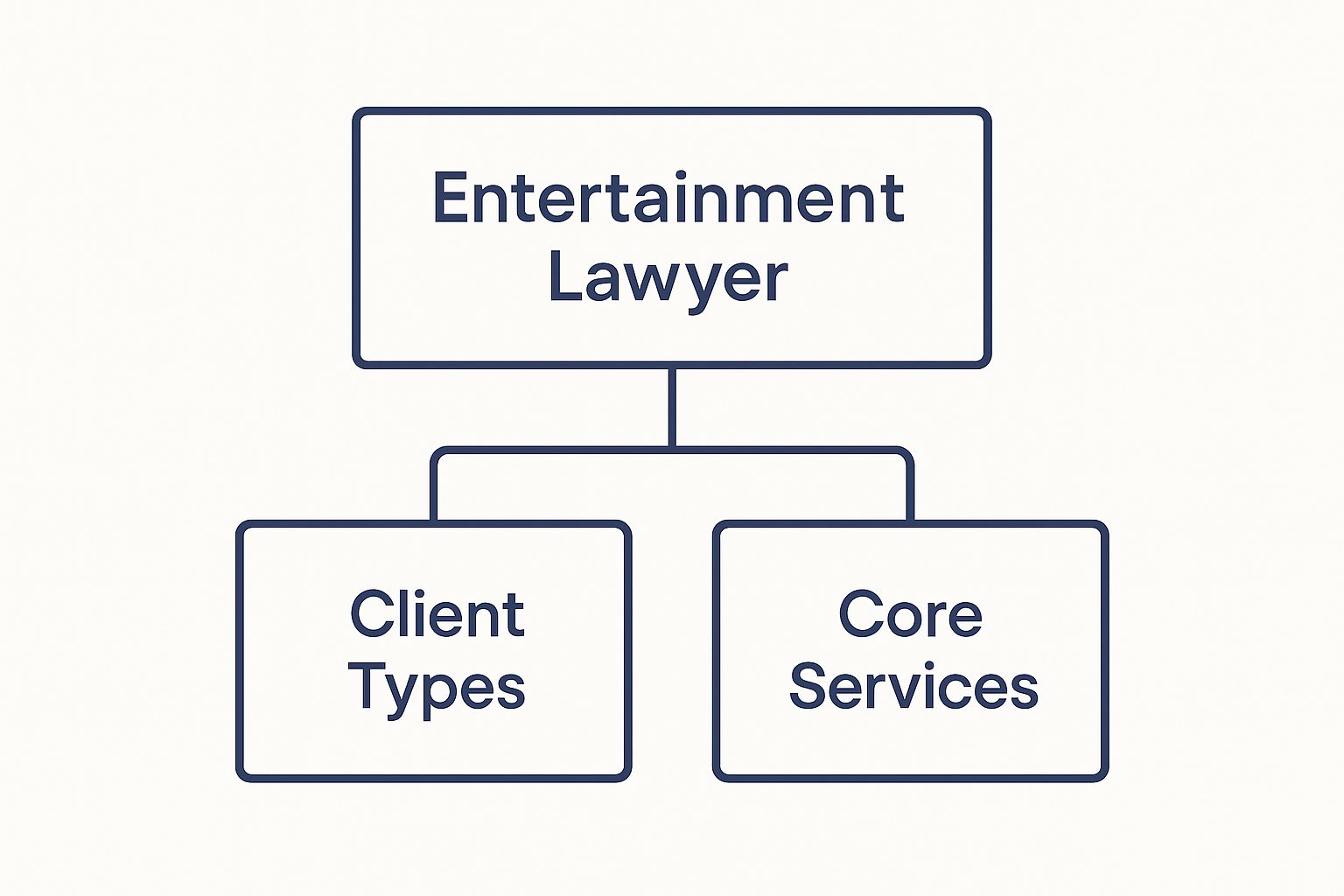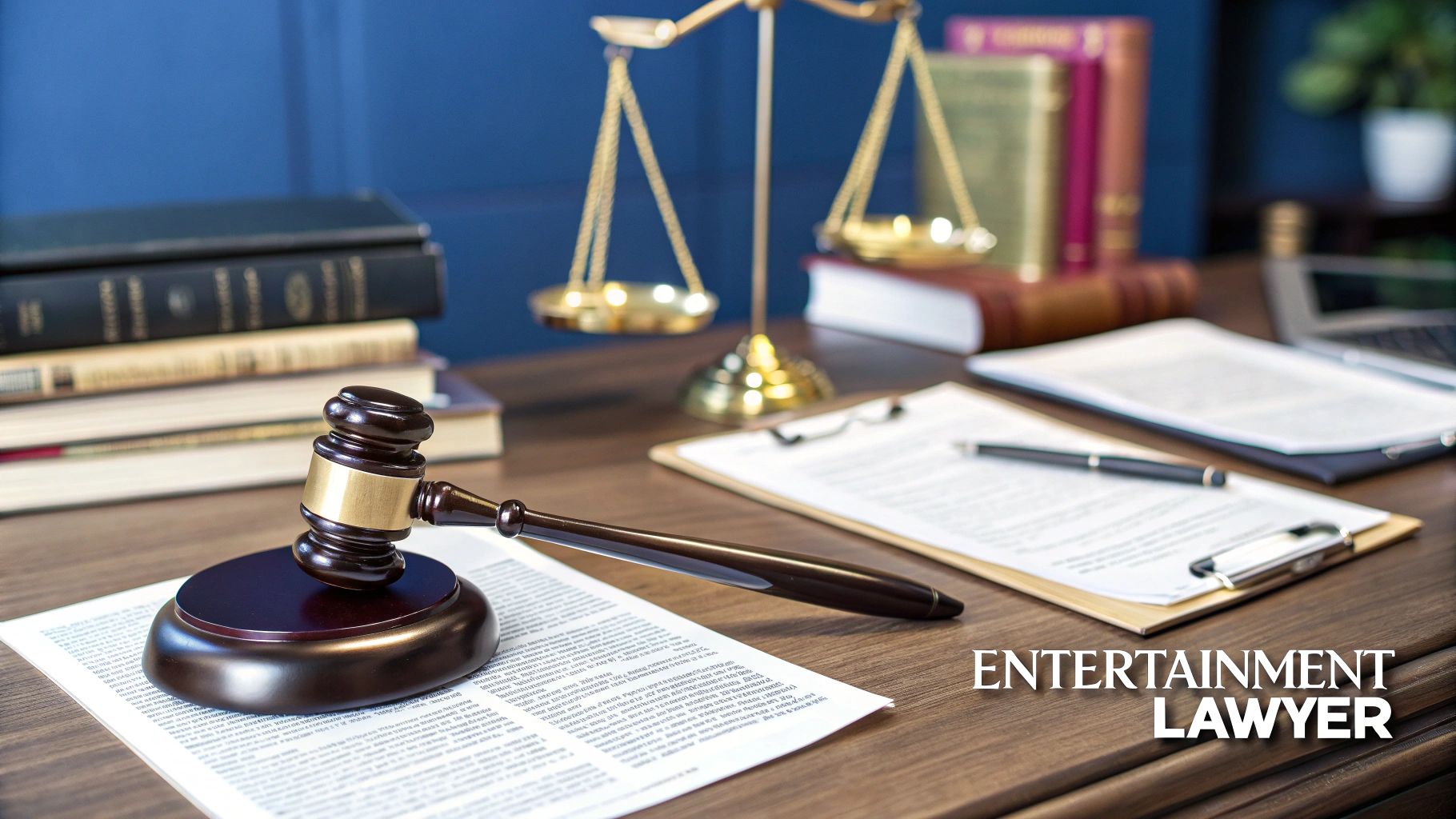Entertainment lawyers are much more than just attorneys; think of them as strategic business partners for anyone in the creative world. They are the legal minds behind your favorite movies, music, and online content. Their job is to make sure artists and production companies are protected while helping their projects succeed financially.
Your Creative Career's Most Valuable Player
Picture your creative project鈥攁 song, a film script, a new brand鈥攁s a star athlete. You鈥檝e put in the work to nurture this talent, but who鈥檚 in the background negotiating the big contracts, handling the business side, and shielding them from bad deals? That's exactly what an entertainment lawyer does.
They aren't just there to give legal advice. They're a unique mix of coach, agent, and business manager, all wrapped into one, with a deep knowledge of the law. Their entire focus is on building and protecting your career in an industry famous for its complexities and high stakes.
What an Entertainment Lawyer Does
At its core, this specialty pulls from multiple areas of law to fit the unique needs of the entertainment industry. A top-tier entertainment lawyer brings a wide range of skills to the table, including things you might not expect, like for negotiations and sorting out disputes from anywhere in the world.
This image breaks down who they work with and what they do.

As you can see, these lawyers help both individuals (like musicians and actors) and businesses (like studios and labels) with critical services like contract negotiation and intellectual property protection. This dual focus means they understand the entire creative ecosystem.
Ultimately, their job is to handle the complicated business and legal stuff so creators can do what they do best: create. If you want to dive deeper into this world, our guide to music and entertainment law offers more detail.
An entertainment lawyer's role varies across different creative fields, but their goal is always to protect and advance their client's interests. The table below highlights some of their key responsibilities in different sectors.
Key Roles of an Entertainment Lawyer Across Industries
| Creative Field | Primary Role of the Lawyer | Example Task |
|---|---|---|
| Music | Negotiate contracts and manage rights. | Securing a favorable recording contract with a major label. |
| Film & TV | Handle production legalities and distribution. | Drafting agreements for actors, directors, and crew. |
| Publishing | Protect literary works and manage author rights. | Negotiating a book deal, including advances and royalties. |
| Digital Media | Navigate online content and influencer agreements. | Creating sponsorship contracts for a YouTube creator. |
No matter the industry, these lawyers are the ones ensuring the deals are fair and the creative work is legally sound. They are essential for navigating the business side of any creative career. Some of their most common responsibilities include:
- Contract Negotiation: Fighting for the best terms in recording deals, film rights, publishing agreements, and brand sponsorships.
- Intellectual Property (IP) Protection: Filing copyrights and trademarks to shield original work from being stolen or used without permission.
- Business Formation: Helping artists or bands set up an LLC or corporation to manage their finances and limit personal liability.
- Dispute Resolution: Stepping in to represent clients in fights over unpaid royalties, broken contracts, or copyright infringement.
Going Beyond Contracts to Build Your Career

It鈥檚 a common misconception that an entertainment lawyer's job begins and ends with reviewing contracts. While that鈥檚 definitely a crucial piece of the puzzle, it鈥檚 like saying a film director鈥檚 only job is to yell "action!"
The reality is so much bigger. A great entertainment lawyer is proactive, strategic, and often the architect of your entire business structure. They are the dealmakers and advisors working behind the scenes to turn your creative passion into a long-term, sustainable career.
The Architect of Your Creative Business
Think of your lawyer as the co-builder of your career. They don't just react to offers as they come in; they help create opportunities and lay the legal groundwork that allows you to grow safely and profitably.
This is especially critical in an industry that鈥檚 exploding in scale. The global media and entertainment business is projected to see box-office receipts blow past $50 billion and streaming subscriptions exceed 1.5 billion by 2025. All that growth brings more complexity around intellectual property and deal-making, making a sharp lawyer absolutely essential.
Let's look at a few real-world examples:
- For Musicians: Your lawyer helps you clear the rights to that perfect sample for a song that could be a hit. This simple step prevents a lawsuit that could completely derail your career right as it's taking off.
- For Filmmakers: They guide an indie director through the maze of securing financing, structuring fair deals with investors, and hammering out a distribution agreement that gets their film seen.
- For Digital Creators: They spot the red flags in a brand sponsorship contract, protecting a YouTuber from predatory terms that could damage their brand integrity and earning potential down the road.
An entertainment lawyer鈥檚 true value isn't just in the immediate opportunity鈥攊t's in their ability to anticipate challenges and structure deals that support your long-term vision. They build the legal framework so you can focus on what you do best: creating.
This kind of strategic career development is key, especially when navigating brand collaborations. Understanding gives you context, but your lawyer ensures those partnerships are built on solid ground.
Ultimately, getting familiar with the different types of contracts for entertainment is the first step toward appreciating just how critical your lawyer鈥檚 role really is.
Navigating the New Digital Frontier

The entertainment world used to be a pretty straightforward place, dominated by Hollywood studios and major record labels. Not anymore. Today's landscape is a sprawling, almost chaotic mix of streaming giants, social media empires, AI-generated art, and even virtual concerts.
This explosion of new platforms creates some incredible opportunities, but it also kicks up a ton of new legal dust. This is where a sharp entertainment lawyer comes in. Think of them as an experienced guide charting a course through these wild, uncharted waters. They help creators and businesses jump on modern opportunities without falling into the hidden legal traps of digital media.
Modern Headaches for Creators
The questions artists and creators face today are way more complex than they were even a decade ago. For instance, what are fair terms when a series you created is suddenly streaming worldwide on Netflix? How do you even begin to handle a copyright dispute when an AI has been trained on your work without your permission?
These scenarios point to a massive shift. For creators diving into the world of online platforms, knowing the various is one thing, but an entertainment lawyer makes sure those ventures are built on solid legal ground.
This growing complexity is driving a huge need for lawyers who actually get this stuff. By 2025, the entertainment and media industries are expected to be among the fastest-growing fields hiring legal pros, mostly because of tricky IP issues and new tech like AI and VR.
In this new frontier, an entertainment lawyer's role is not just about protection鈥攊t's about empowerment. They provide the strategic framework that allows creators to confidently innovate and monetize their work in a constantly changing environment.
They're the ones in your corner helping you tackle the most pressing modern issues, like:
- Streaming Deals: Negotiating fair pay and ownership rights with the big players like Spotify, Apple TV+, and Amazon Prime.
- AI and Copyright: Fighting the unauthorized use of your work to train AI models and figuring out how to claim ownership over creations you make with AI.
- Influencer and Brand Agreements: Drafting crystal-clear, protective contracts for social media collabs that spell out exactly what's expected and how your content can be used.
- Virtual and Augmented Reality: Sorting out the licensing and IP rights for content made for the metaverse and other immersive experiences.
Knowing When to Hire an Entertainment Lawyer

Hiring a lawyer can feel like a massive step, especially when you鈥檙e just starting out and watching every single penny. So, when does it go from being a "nice-to-have" to an absolute necessity? Figuring that out can be the difference between building a real career and walking straight into a crisis you could have easily avoided.
Think of it this way: you wouldn't build a house without an architect looking over the blueprints. An entertainment lawyer does the same thing for your creative business鈥攖hey make sure the foundation is solid before you start putting up the walls. Trying to skip the legal check-up at key moments is a huge gamble.
Key Moments You Absolutely Need Legal Counsel
Every artist鈥檚 path is different, but certain milestones almost always demand a legal expert's eye. These are the moments when a major opportunity鈥攐r a major risk鈥攍ands on your desk. Spending the money on a lawyer at these trigger points is one of the smartest investments you can make for your work and your future.
Waiting until a problem blows up is a reactive move, and it's almost always more expensive. The most successful creators are proactive. They bring in a lawyer at the first sign of a major career move to make sure every opportunity is squeezed for all it's worth and every risk is managed.
Here are the most common situations where you should stop what you're doing and call an entertainment lawyer:
- You're Offered a Major Contract: This is the big one. We're talking record deals, publishing agreements, film distribution offers, or major brand sponsorships. Never sign a long-term agreement without a legal review.
- You Need to Protect Your Work: When it's time to officially copyright your songs, trademark your band's name, or license your art for someone else to use, a lawyer ensures it gets done right the first time.
- You're Forming a Business: Is your band ready to become an LLC? Are you launching a production company? You need legal guidance to structure the business properly from day one.
- A Dispute Pops Up: Whether it鈥檚 a fight over royalties, a claim that someone stole your work, or a simple disagreement with a partner, you need an expert in your corner to navigate it.
How to Find the Right Legal Partner
In the entertainment world, you can't just pick any lawyer out of a hat. You need a strategic partner who lives and breathes the industry鈥檚 unique rules and, just as importantly, understands your creative vision. Finding the right fit is about much more than legal credentials; it鈥檚 about finding a guide who knows the terrain.
Start by looking for someone with a proven track record in your specific corner of the industry. A music lawyer gets the nuances of royalty streams and sampling clearances in a way a film lawyer doesn't. And that film lawyer? They're an expert in production financing and distribution deals. Their focused experience is your single biggest asset.
Where to Begin Your Search
Your professional network is almost always the best place to start. Ask other artists, producers, or managers you trust for referrals. Their firsthand accounts can give you the real story on a lawyer鈥檚 style, responsiveness, and effectiveness.
- Industry Referrals: Talk to peers who have successfully closed deals similar to the one you're facing.
- Professional Organizations: Groups like Volunteer Lawyers for the Arts (VLA) can be fantastic resources, especially for emerging creatives.
- Bar Associations: Many state and local bar associations have referral services that can point you to entertainment law specialists.
Key Questions for Your Consultation
Once you've got a shortlist, the consultation is your chance to really vet them. This isn't just about their qualifications on paper; it's a gut check to see if your goals and communication styles actually click.
Think of this first meeting as an audition. You are interviewing them for a critical role on your team. Their ability to understand your vision and explain complex legal ideas in simple terms is just as important as their resume.
Come prepared with a list of questions that go beyond their experience. Ask about their fee structure right away鈥攄o they charge hourly, take a percentage of the deal, or work on a retainer? A transparent conversation about costs is non-negotiable.
Also, ask them about their experience with new media. This is a huge deal. With the US streaming market alone expected to jump from $61.9 billion in 2024 to nearly $112.7 billion by 2029, having a lawyer who is behind the curve is a massive liability. You can discover more insights about this expansion and its impact on PwC鈥檚 media outlook.
Finding the right legal partner is a foundational step in building your career. To get a better handle on what makes a great legal ally in this field, explore our comprehensive guide on choosing an entertainment law lawyer.
Your Questions About Entertainment Lawyers Answered
Jumping into the world of entertainment law can feel like a lot, especially when you're trying to figure out how it all applies to your own creative path. I get it. Below, I鈥檝e tackled some of the most common questions I hear from artists and entrepreneurs to clear things up and give you the straightforward answers you need.
Can I Just Use a General Business Lawyer Instead?
While a general business lawyer is fantastic for standard corporate stuff, they often miss the specific quirks of the entertainment industry. This field operates with its own unique playbook, from complex guild regulations like SAG-AFTRA to specialized contract structures and intellectual property challenges that just don't exist anywhere else.
An entertainment lawyer knows this landscape, the key players, and the critical deal points that will protect you and your work. Think of it this way: you wouldn't hire a general negotiator to handle a pro athlete's contract; you'd hire a dedicated sports agent. They know the game you're playing.
How Do Entertainment Lawyers Usually Charge?
Fee structures can vary, and it's essential to understand the options before you commit. The right model really depends on the type of work you need done.
- Hourly Rate: Many lawyers charge a set rate for every hour they spend on your case. This is pretty common for ongoing advice or smaller, one-off tasks.
- Percentage Basis: For big deals, some lawyers take a percentage鈥攖ypically 5%鈥攐f the earnings from a contract they successfully negotiated for you.
- Retainer: A retainer is a set fee you pay monthly or annually for continuous, on-call access to legal counsel.
Always, always discuss fees upfront and get a clear, written agreement. Transparency isn't just nice to have; it's the mark of a professional you can actually trust.
Don't let a tight budget stop you from protecting your creative work. Exploring different payment options can give you the legal shield you need to build your career on a solid foundation, even in the early stages.
Can I Get Legal Help if I Have No Budget?
Absolutely. Plenty of people in the legal community recognize the financial hurdles that emerging artists face. Some lawyers are open to working with promising new talent and might offer flexible arrangements, like a deferred payment plan where they get paid once you start earning from the project they helped you with.
You should also look into non-profit organizations. Groups like exist specifically to provide pro bono (free) or low-cost legal services to artists who meet certain income criteria. Protecting your work is a critical investment, and there are ways to make it happen at every stage of your career.
At Cordero Law, we believe in empowering creators with clear, strategic legal guidance built for the unique challenges of the entertainment industry. If you're ready to protect your vision and build a lasting career, check us out at to see how we can become your trusted legal partner.
